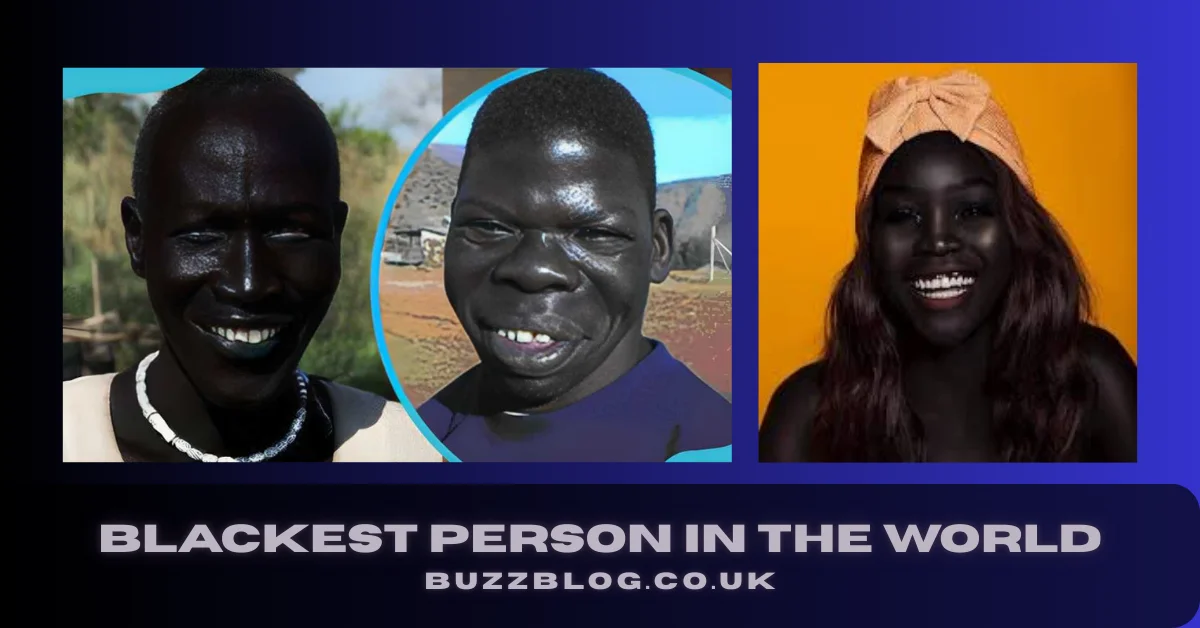Introduction
Have you ever stumbled upon headlines claiming someone to be “the blackest person in the world”? It sounds striking, doesn’t it? But behind this phrase lies a mix of science, culture, and a fair share of misconceptions. Human skin tones are incredibly diverse, shaped by genetics, geography, and history. So, can we really crown one individual as the “blackest”? Let’s explore what science and society say about it.
Understanding Skin Pigmentation
Skin color isn’t just a random trait—it’s determined by melanin, a natural pigment produced by special cells called melanocytes. The more melanin your body produces, the darker your skin appears. Think of melanin as nature’s sunscreen—it protects you from harmful ultraviolet (UV) rays.
Different Types of Melanin
Here’s where it gets interesting: not all melanin is the same.
- Eumelanin is responsible for brown and black shades. The more you have, the darker your skin.
- Pheomelanin, on the other hand, creates lighter tones, such as yellowish and reddish hues.
The ratio of these two pigments is what makes skin tones so wonderfully diverse.
Geographical Influence on Skin Color
Ever noticed how people closer to the equator tend to have darker skin? That’s no coincidence. In regions with intense sunlight, higher melanin levels act as protection against UV damage. Meanwhile, people in northern areas evolved lighter skin to absorb more vitamin D from limited sunlight.
Historical Evolution of Dark Skin
Early humans in Africa developed dark skin as a survival mechanism. It was nature’s way of shielding them from strong sun exposure. This evolutionary trait not only offered protection but also shaped how populations adapted as they migrated across the globe.
Can We Measure “The Blackest”?
Scientists can measure pigmentation levels using tools like spectrophotometers and classification systems such as the Fitzpatrick scale. However, these measurements aren’t designed to rank who is “the blackest person in the world”—they’re meant for medical and dermatological purposes.
Notable Individuals Known for Deep Skin Tones
Names like Nyakim Gatwech, a South Sudanese model, often appear in conversations about extremely dark skin. Similarly, various tribes in South Sudan and East Africa are celebrated for their rich, deep complexions. These individuals showcase the beauty of high melanin concentration.
Misconceptions About Being “The Blackest”
Here’s the truth: trying to determine the absolute darkest skin tone is misleading. Skin color exists on a spectrum, and even within families or tribes, shades vary. Moreover, reducing identity to a “record” ignores the cultural richness behind these individuals.
Cultural Beauty Standards Around Dark Skin
Across Africa, dark skin is often seen as a symbol of strength, heritage, and beauty. Yet, global media has historically favored lighter skin. Thankfully, in recent years, there’s been a shift. Dark-skinned models and celebrities are rewriting beauty standards, proving that melanin-rich skin deserves celebration.
The Impact of Colorism
Unfortunately, darker skin hasn’t always been celebrated. Colorism—discrimination based on skin shade—remains a pressing issue worldwide. From job opportunities to media representation, people with very dark skin tones often face unfair treatment. Raising awareness about this helps challenge old stereotypes.
Scientific Curiosity vs. Human Identity
Sure, scientists can analyze pigmentation levels. But does that define a person? Absolutely not. Identity is shaped by culture, personality, and individuality—not just melanin counts. At the end of the day, being labeled “the blackest” is far less meaningful than embracing who you are.
Representation in Fashion and Media
Models like Nyakim Gatwech and Khoudia Diop have used their striking dark complexions to redefine beauty. Their success isn’t about being “the blackest,” but about showcasing confidence and diversity on a global stage. Representation matters, and it’s inspiring to see progress.
Is There Really a “Blackest Person”?
Scientifically speaking, no official title exists. Skin color cannot be ranked like tallest height or fastest speed. What’s important is acknowledging the broad spectrum of human diversity rather than chasing a label.
Why the Fascination with Extremes?
Humans love records—“the tallest,” “the heaviest,” “the fastest.” The idea of “the blackest person” plays into this obsession with extremes. Add social media into the mix, and suddenly, unique appearances go viral overnight. But curiosity shouldn’t overshadow respect.
Conclusion
So, is it possible to determine the blackest person in the world? Technically, no. Skin tone isn’t about competition—it’s about evolution, adaptation, and identity. Instead of seeking titles, we should celebrate the full spectrum of melanin and the beauty it brings to humanity. Diversity isn’t just skin deep—it’s our greatest strength.

